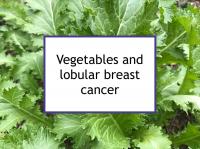The current webpage is designed to make additional research available concerning how various vegetables and vegetable components influence lobular breast cancer risk, development, growth and prognosis. At the bottom of this webpage are links to studies relating to the beneficial vegetables listed in Foods to eat and avoid for lobular breast cancer patients & survivors.
There are very few studies that directly investigate the influence of vegetables or micronutrients on lobular breast cancer since there are no experimental lobular breast cancer cells. Dietary, but not supplemental, beta-carotene (found, for example, in broccoli, butternut squash and carrots) and dietary fiber each have been reported to prevent lobular breast cancer. Adherence to the Mediterranean diet has also been reported to reduce the risk of lobular breast cancer more than the risk of ductal breast cancer.
Since lobular breast cancer typically is characterized by greatly reduced expression of E-cadherin (a protein that facilitates cell-to-cell adhesion), vegetable consumption can inhibit lobular disease through the actions of micronutrients that increase E-cadherin expression, among them:
In addition, cruciferous vegetables such as kale oppose lobular breast cancer through the actions of sulfur-containing compounds which also increase E-cadherin expression, including isothiocyanates (allyl isothiocyanate (AITC), benzyl isothiocyanate (BITC), and phenethyl isothiocyanate (PEITC)), as well as sulforaphane, I3C and DIM.
Please read the applicable food webpages when making your own food lists since these pages contain important advice, food rankings (e.g., highly recommended, recommended in moderation), consumption limits, and other pertinent information.
Vegetable compounds should be obtained by eating vegetables rather than taking supplements. When a beneficial micronutrient is administered at low doses by consuming food, it is likely to have subtle chemopreventive effects, whereas the same compound administered at high doses is more likely to have pharmacological effects, with possible unwanted outcomes. For example, quercetin has been reported to contribute to the growth of estrogen-induced mammary tumors once the tumors were established in female rats.
